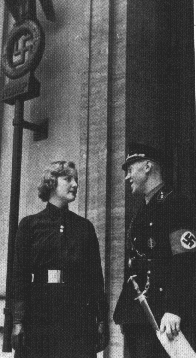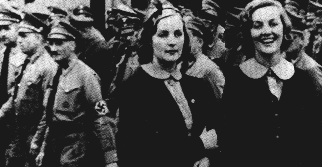Great friends and bitter enemies
|
In 1955,
Decca returned to England for the first time in sixteen years. Much had happened in that period; her marriage to Esmond and his death, forging a new life with Bob Treuhaft, three children born. The old family squabbles were far in the past, offenses not forgotten, but mostly forgiven. Then, visiting one of the Mitford homes, she found a poignant relic: still etched in the windowpanes were little swastikas -- and beneath each, a matching hammer-and-sickle.
The swastikas were carved by her sister Unity; the communist emblems by Decca. At the time Unity was 18, and Decca just 15. They were great friends and bitter enemies.
In some ways, it was a normal rivalry between siblings; in contemporary terms, it would be like finding one child devoted to Arnold Schwartzenegger movies and the other, Woody Allen films. "There was a room that Unity and I shared when we really didn't want to be with grownups," Decca says. "We barricaded it with chairs and had fights; she had all the Hitler stuff and I had all the communist stuff." With a line drawn down the middle of the room, half was a Nazi shrine created by Unity. The walls on the other side were covered with Decca's pictures of Lenin and revolutionary posters.
Even events surrounding her birth were littered with Nazi portents, a fact not overlooked later by the Germans. She was concieved in a cabin in Northern Ontario, where her father was speculating on a gold mine, and the nearby town was called "Swastika." She was given the name Unity because her parents hoped that the just-begun WWI would end peacefully. And if that proved unlikely, they hedged their bets with her middle name: "Valkyrie," after the Norse maidens of war. A Valkyrie is also the central character in Richard Wagner's Ring operas, much loved by Hitler.
|
|---|
Within months, the tall, beautiful English woman was part of Hitler's inner circle
|
The game
turned serious after Unity began spending more time with their older sister, Diana. At the time Diana was the family's black sheep -- an honor that Decca would assume a few years later. Diana was divorced, which in their parent's eyes, brought deep shame upon the family. The younger Mitford girls were told that it was now unlikely that they would ever marry, because no respectable man would associate with a sister of a divorcee. To Unity and Decca, it made Diana all that more exotic.
Unity began sneaking over to Diana's apartment where she met Oswald Mosley. Besides being Diana's lover, he was also the charismatic leader of the British Union of Fascists -- the English equivalent of the Nazi party. Unity joined up, and confided to Decca that she planned to learn German, travel to Germany and meet Hitler.
Their parents thought it all a great joke. Unity persisted. Finally, they agreed to send her to Munich; after all, she was expected to have her Year Abroad before marriage.
Her obsession with meeting Hitler increased (if possible) now that she was in his home town. Through her German tutor she learned that he often had lunch at a certain restaurant, and quickly befriended the doorman and waitresses. On occasions when Hitler did appear, she wait at her table until he left, hoping he might pass by notice her. He did, and invited her to join them for lunch. Within months, the tall, beautiful English woman was part of Hitler's inner circle, pals with the leaders of the Third Reich.
Back in England, Decca was dismayed to find Unity and Diana's names in the newspapers as Hitler's pet Britons. "Perfect specimens of Arayan womanhood" Hitler supposedly called them, and the quote was often repeated in the British press. For a while, 15 year-old Decca considering buying a gun and assassinating Hitler. "It wouldn't have been a problem," she says today. "I mean, you could get a small revolver; I don't think there were any restrictions in those days. You'd just put it in your bag and whip it out at the right time. But that all wouldn't have been the problem; you'd obviously be killed immediately. You know how it is -- you have a strong will to live at that age."
Both Diana and Unity were also pressuring their parents to visit Germany and meet their new friends. Their parents resisted, at first; Hitler was hardly an upper-class person. Still, the man had destroyed the German Communist Party and crushed the unions, so he couldn't be all bad. They finally agreed, and returned full of enthusiasm for the Reich. In gratitude and admiration, they sent Hitler an expensive gift, a Japanese bronze sculpture of a life-size eagle alighting on a rock -- exactly the kind of gaudy kitsch that Hitler loved.
While Unity was addressing Nazi rallies wearing her black shirt -- and carrying a special badge personally signed by Hitler -- Diana was becoming more involved with Mosley's British fascists. The group was quickly gaining national attention and holding huge meetings, where more than 15,000 would attend. These gatherings were often interrupted by Communists -- among them 15 year-old Esmond Romilly, Decca's future husband.
Diana and Mosby finally married, but secretly; she didn't want the British press to notice. Hitler promised to make sure the Registrar would keep it quiet, and they exhanged rings at the Berlin home of Josef Goebbels, a close personal friend to both Mitford sisters.
|
|---|
Diana and her husband were imprisoned when the war began
|
These were
heady times, particularly for Unity. If any excuses can be made, it must be remembered that she went from the cloistered world of their fortress home to become one of the Berlin elite, all within a single year. The 18 year-old girl who her parents did not take seriously now had the Fuhrer of the Thousand-Year Reich seeking her opinions.
As war between Germany and England grew closer, Unity was torn. She loved both countries equally, and often said she would rather die than see either destroyed. She was good for her word: on the day that Britian and the Reich declared war, she pressed a pistol against her head and fired a bullet into her brain. She survived, but remained an invalid until her death in 1948.
Decca:
The only area of my life which I could not share with Esmond was my attachment to Boud. [Boud was Unity's nickname.] Perversely, and although I hated everything she stood for, she was easily my favorite sister, which was something I could never have admitted in those days, above all to Esmond. I had tried, most of the time successfully, to banish her from my mind after the war broke out. There had been little news about her in letters from the family; no one knew exactly where she was or what had become of her. A cousin wrote to say that she had returned to Germany in August taking a pistol with her, with which she planned to commit suicide when the war started. While we were in Washington the papers carried occasional rumors about Boud -- that she had entered a convent, that she was dangerously ill. The thought of her, alone and ill -- perhaps dying (dreadful word! too awful to hold in one's mind for more than a moment) -- filled me with terrible distress. I could only take comfort in the thought that Boud herself, to whom loyalty was the supreme virtune, would be the first to understand that the war had parted us forever.

Mosby and Diana were arrested a few months after the war began, and they joined other Nazi sympathizers in prison. She complains long about the conditions in her repugnant autobiography (she still defends Hitler and the Nazis, and claims the Holocaust occurred because "world jewry with its immense wealth could not not find the money" to relocate European Jewish citizens). But in reality, her conditions were excellent, if not to her liking. Thanks to the personal intervention of Winston Churchill, Mosby and Diana were allowed to share a privileged cell. They were released before the end of the war, and Diana is still alive.
|
|---|
Did they influence Hitler's decisions?
|
One important
question about the adventures of Unity and Diana has never been explored: did they influence Hitler? Did they give the Nazis a tainted picture of England and its people, and lead them to believe that the nation was unwilling to fight, and perhaps even sympathetic to the Germans?
Diana touches upon this topic in her memoirs and quickly dismisses it. "Imagine the situation reversed. Imagine Chamberlain, or Churchill, as prime minister making friends with a German girl...he would have hundreds of sources of information, beginning with his ambassador...it is inconceivable that he would ignore all this and believe only this German girl."
 It is, of course, an obviously flawed analogy. Churchill and Chamberlain did not have a German girl as confidante; Hitler did have an English one -- Unity Mitford. So close were they that Hitler took time to call the hospital repeatedly after her suicide attempt, despite his preoccupation with the invasion of Poland. Before she was transported back to England -- in itself unusual for countries at war -- he visited to say goodbye.
It is, of course, an obviously flawed analogy. Churchill and Chamberlain did not have a German girl as confidante; Hitler did have an English one -- Unity Mitford. So close were they that Hitler took time to call the hospital repeatedly after her suicide attempt, despite his preoccupation with the invasion of Poland. Before she was transported back to England -- in itself unusual for countries at war -- he visited to say goodbye.
Besides their personal friendship, Hitler may have also seen Unity and Diana as important conduits for the Nazi cause. They were, after all, members of the peerage. "Hitler got it all wrong," says Decca. "They never understood British politics, and they thought just because my father was a Baron, Lord Redesdale, that meant he was powerful. We're these sort of backwooods peers, of which my father was one, who had no influence whatsoever, on politics...Hitler thought that automatically anyone who was Lord somebody must be very important. He didn't get the point of it all."
No better example of their mistaken notions can be found than Rudolph Hess' mad flight, two years later. Apparently believing he could ask the sympathetic Duke of Hamilton to negotiate a peace, the Reich Minister parachuted into Scotland. He was quickly arrested. During his interrogation, Hess repeatedly demanded to speak to the "opposition party," of which he thought the Duke of Hamilton was a leader. In other words: as late as 1941, at least some in the German high command believed they enjoyed wide support in Britian.
So does some measure of the responsibility for WWII lie with Decca's sisters? It will always be an intriguing, but unanswerable question.
|
|---|




 Unity and Diana Mitford
Unity and Diana Mitford